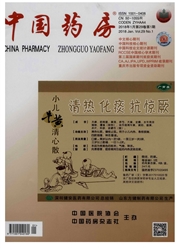

 中文摘要:
中文摘要:
目的:研究黄芩苷/黄芩素对耐甲氧西林金黄色葡萄球菌(MRSA)抗药性的逆转作用,并初步探索其逆转机制。方法:以平皿法测定黄芩苷/黄芩素与苯唑西林对MRSA的协同抗菌效力;以分光光度法测定黄芩苷/黄芩素协同苯唑西林对MRSA生长密度的抑制作用;以青霉素结合蛋白(PBP2a)胶乳凝集试剂盒检测黄芩苷/黄芩素对PBP2a生成的抑制效力。结果:黄芩苷/黄芩素联合苯唑西林对临床分离的MRSA有显著的协同抗菌作用,16μg·mL^-1的黄芩素即可显著逆转MRSA对苯唑西林的高度耐药;黄芩苷/黄芩素对MRSA产生PBP2a有显著抑制作用。结论:黄芩苷/黄芩素可通过抑制MRSA产生PBP2a来逆转其对苯唑西林的高度耐药,这一现象从理论上为临床治疗MRSA感染提供了新的方法和思路。
 英文摘要:
英文摘要:
OBJECTIVE : To study the reverse effect of Baicalin/Baicalein on antibiotic resistance of methicillin - resistant staphylococcus aureus (MRSA) and its mechanism. METHODS: The synergetic antimicrobial effect of oxacillin and Baicalin/ Baicalein against MRSA were detected by plating method, and the synergetic antimicrobial effect of oxacillin and Baicalin/ Baicalein on growth density inhibition of MRSA was detected by spectrophotometry. The inhibitory effect of Baicalin/Baicalein on PBP2a synthesis was detected by PBP2a latex agglutination assay kit. RESULTS: The combination of Baicalin/ Baicalein with oxacillin showed remarkable synergetic antimicrobial effect on clinical isolated MRSA. 16μg·mL^-1 of Baicalein obviously reversed the strong resistance of MRSA to oxacillin. Baicalin/ Baicalein showed remarkable inhibitory effect on PBP2a production in MRSA. CONCLUSION: Baicalin/Baicalein can reverse MRSA' s strong resistance to oxacillin by inhibiting PBP2a secretion in MRSA. Theoretically, this phenomenon offers a new approach for the treatment of infections caused by MRSA.
 同期刊论文项目
同期刊论文项目
 同项目期刊论文
同项目期刊论文
 期刊信息
期刊信息
